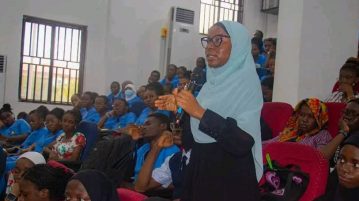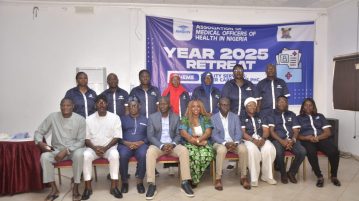Сase 1: Typhoid Perforation in a 17 year old male student (Ha. A.)
Introduction: A 17 years old male from Maikaho Village in Gombe State presented to the emergency room of the General Hospital Deba, Gombe state with sudden onset of Abdominal pain, Fever and vomiting of 5days duration.
The fever was said to be intermittent and not associated with chills and rigors. Vomitus contained previously ingested meals and was non-projectile. There was history of use of Herbal concoction and Buscopan to alleviate symptoms but there was no improvement.
Last meal before onset of symptoms was Maize and Millet. Source of drinking water is from the well and sewage disposal is through pit latrine. He also complained of inability to pass stool 3 days after onset of symptoms. There is no history of diarrhoea.
Physical Examination revealed a child acutely ill-looking and in painful distress, moderately dehydrated, tachypneic (30cpm), tachycardic (110bpm).
Abdominal Examination revealed a distended abdomen. There was generalized tenderness evident by guarding and was maximal at the right iliac fossa. There was no hepatomegaly and splenomegaly. Kidney were not bimanually ballotable. Bowel sounds were hypoactive and digital rectal examination showed no abnormality.
An assessment of Typhoid perforation was made.
Intervention and Investigation: He was resuscitated with Paracentesis done aspirating about 5mls of Pus and worked up for an emergency laparotomy. Hematocrit was 33%.Retroviral screening was negative. He was positive for Hepatitis B.
Serum Electrolyte Urea and Creatinine could not be done due to financial constraint and it’s not done as a routine test in the laboratory. Surgery was delayed for 4 hours as the father was financially constrained.
In surgery, a perforation was found at the terminal ileum intraoperative and about 1.5litres of fecal matter was drained. The bowel was irrigated and the perforation was repaired.
Postoperative period was uneventful. He made steady recovery and he was discharged fourteen day post-operative day. He was to be followed up in clinic but he defaulted.
Сase 2: Typhoid Perforation in a 17 year old male student (Hu. A.)
Introduction: The twin of the patient from case 1 presented 4days later from the same location with complaints of abdominal pain with sudden onset, associated with fever and vomiting of 3days duration.
Fever was said to be persistent and not associated with chills and rigors. Similar symptoms as observed in the other twin prompted the parent to rush him to the hospital.
An assessment of Typhoid perforation was made. He was resuscitated and rushed to theatre for exploratory laparotomy. A perforation was found at the terminal ileum and about 2litres of fecal matter was drained. Bowel was irrigated and repaired.
Postoperative period was also uneventful. PCV done on the 4th day after surgery was 30%. Hepatitis B screening done came out as positive. He made steady recovery and was discharged on the twelfth day postoperative.
Both patients were commenced on treatment for Hepatitis B (Tenofovir/lamivudine and Silybon). They were also expected to present for follow up for hepatitis B but they defaulted.
Management for Typhoid diagnosis
Symptomatic management: IV Fluids, Analgesics
Definitive treatment: Ciprofloxacin
Surgery: Exploratory Laparotomy
Indication for surgery: Typhoid Perforation
Our management plan at General Hospital Deba
Investigations: PCV, MP, Widal, RBS, FBC, EUCr
Post-Operative Treatment: NPO* 72hrs, IV Ciprofloxacin 200mg 12hrly * 5/7, IV Flagyl 500mg 8hrly * 5/7, IM Diclofenac 75mg 12hrly * 3/7, IM PCM 600mg 8hrly * 72hrs
When patients can tolerate orally, Tabs Ciprofloxacin 500mg 12hrly, Tabs Flagyl 400mg 8hrly, Tabs Acetaminophen 1g 8hrly
Discussion
Epidemiology: In 2020, we had 260 cases of Typhoid which makes up to about 5% of hospital presentations. However, exact demographics of the number of patients that have presented couldn’t be gotten due to inadequate data.
Common Factor: They were from the same community. Their source of sewage disposal is via pit latrine and their source of water is from a nearby stream. Some members of the community dispose their refuse on their farmland which is also by the stream. During the rainy season, some members of the community practice open defecation and the wastes get carried away by running water into the stream.
Social Determinant: The major social determinants are poverty, illiteracy and poor access to healthcare.
Lifestyle: The people of the community are Hausa speaking. Farming is their major occupation.
Limitations
At the General Hospital Deba, FBC, LFT and EUCR are not done routinely and samples are usually taken to a tertiary center. In cases of life threatening complication, we don’t usually wait for the result (aside PCV, RVD, Hepatitis B&C) before patients are moved to theatre.
Patients also consider the cost of the tests to be relatively expensive and don’t bother doing the recommended test.
Recommendations
The following interventions are recommended for implementation in the community and across the state;
Health Education and Community Sensitization: This is the most important intervention for a community with little or no knowledge of “Enteric fever” and how it can lead to life threatening complications, if not treated promptly. Members of the community have to be educated on the causes, risk factors, symptoms and appropriate treatment. Looking at their lifestyle (source of drinking water, food preparation, sewage disposal), they need to understand how all of these contribute to making them sick and also putting their children at higher risk. Therefore, extensive education on proper sewage/refuse disposal is highly needed.
Environmental Decontamination: a significant number of reported cases seem to be coming from the same neighbourhood with similar lifestyle and common presentation. Hence, there’s a need for decontamination of the area. Their water should be chlorinated and sewage/refuse disposal should be treated accordingly.
Provision of safe and portable drinking water: There should be an action advocacy by the government nongovernmental organisations and other stakeholders involved for this to be made readily available and equally distributed in the community.
Editor’s note:
Initials of patients were used for confidentiality. This case report was collated and written by Dr. Akinboade Popoola in collaboration with Dr. Ubong Peter (Principal Medical Officer) General Hospital, Deba and Oluwaseunayo Ayando (a public health practitioner) also serving in Gombe State.
Dr. Akinboade is a Medical officer at the General Hospital Deba, a Researcher and Volunteer with passion for Emergency and Disaster Medicine. He’s a graduate of the prestigious College of Medicine of the University of Lagos and an Ambassador of Health Emergency Initiative – an organization committed to saving lives by assisting in providing medical interventions to patients, providing Pre-hospital care to road traffic accident victims and to educate people on health emergencies. He’s also a member of street Medicine network, an organization meeting the medical need of people living on the street in Nigeria. He can be contacted via Akinpopoolamd@gmail.com



